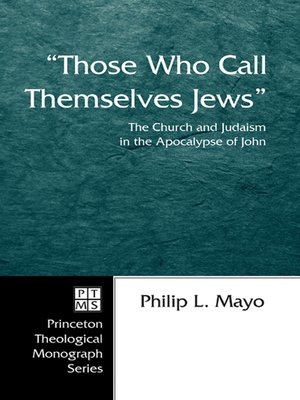"Those Who Call Themselves Jews"
ebook ∣ The Church and Judaism in the Apocalypse of John · Princeton Theological Monograph Series
By Philip L. Mayo

Sign up to save your library
With an OverDrive account, you can save your favorite libraries for at-a-glance information about availability. Find out more about OverDrive accounts.
Find this title in Libby, the library reading app by OverDrive.



Search for a digital library with this title
Title found at these libraries:
| Library Name | Distance |
|---|---|
| Loading... |
The nature of Jewish-Christian relations at the end of the first century has been a subject of serious study and considerable debate. The time between 70 and 150 CE is held to be a volatile time in that Jewish-Christian relations were quickly, although not uniformly, deteriorating. This is a time referred to as the "partings of the ways," when the church was emerging as a religion apart from Judaism. Although it has often been neglected in this study, of particular interest is the Apocalypse of John, since it was written in this dark and turbulent time in Jewish-Christian relations. John, who is a Jewish Christian, is writing to what are likely predominantly Gentile churches. At first, he appears to deny the very name "Jew" to his ethnic kin while accusing them of belonging to Satan (2:9; 3:9). Nevertheless, he does not abandon his own Jewish background and theology. He makes broad use of the Hebrew Scriptures and Jewish cultic imagery while maintaining a Christian understanding that Jesus is the fulfillment of God's redemptive plan. What is of particular interest is how he adopts and adapts this imagery and language and applies it to the church. It is John's mix of Jewish imagery with a Christian message that may provide some insight into his perspective on the relationship between these two increasingly polarized sects. What exactly this perspective is constitutes the subject of the present discussion.







